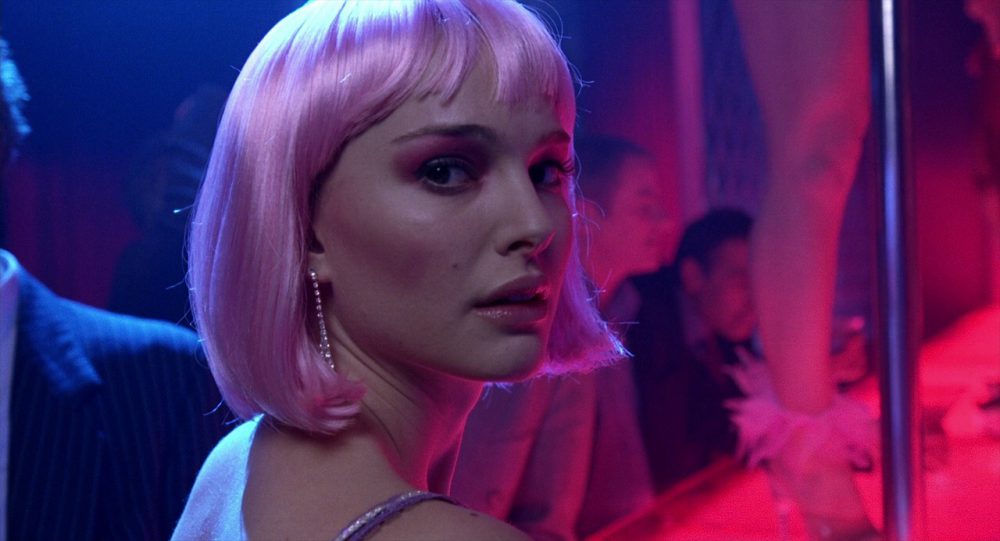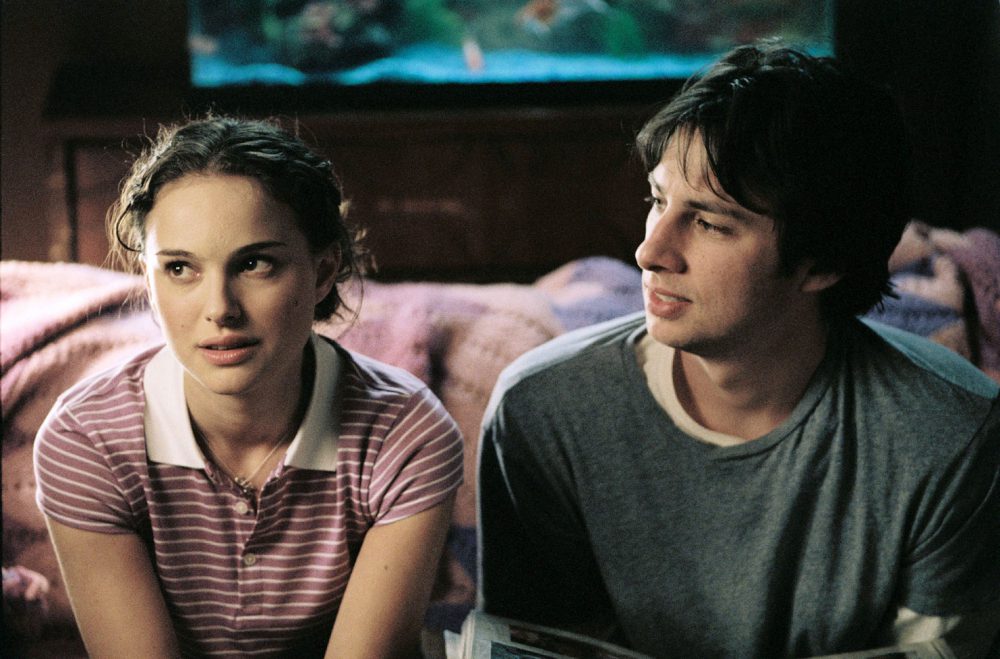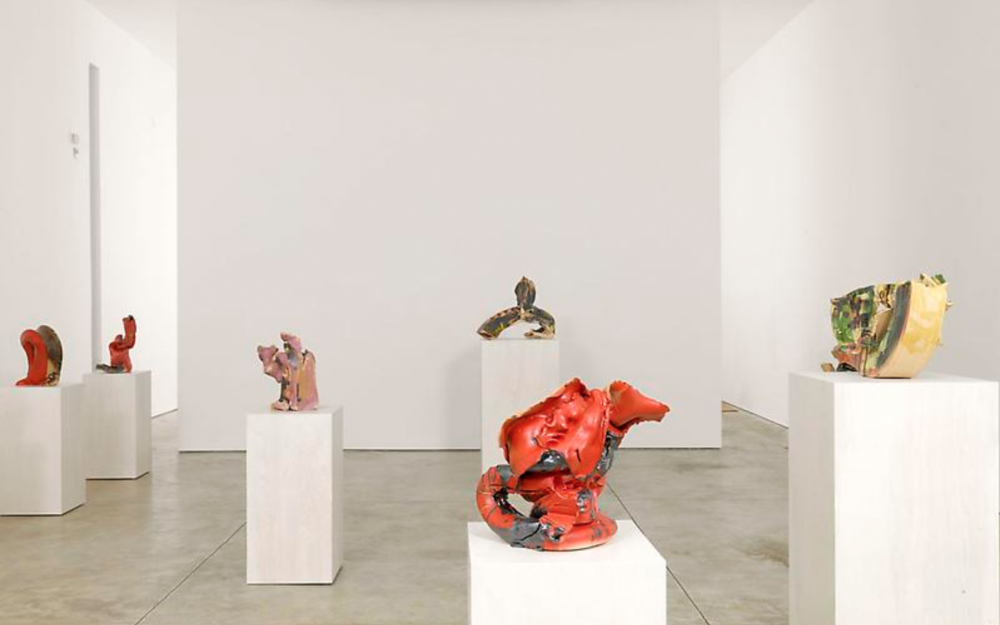On Conflagration: The Masks of Natalie Portman
Laurence Ross reflects on Natalie Portman, the art of the letter, and growing up in and out of the spotlight.

Still of Natalie Portman in Mike Nichols’ Closer (2004). Courtesy Columbia Pictures.
A recent “interview” between author Jonathan Safran Foer (Everything is Illuminated, etc.) and actress Natalie Portman, published in T: The New York Times Style Magazine, takes the form of an email correspondence, including dates and timestamps. The form of the celebrity profile so often purports to give us the inside scoop, but does not typically deliver the intimacy for which we might imagine and hope. Instead, the result is frequently the portrait of a moment between the writer and the celebrity. Foer immediately acknowledges this contrivance when he expresses his relief that the following emails allow him and Portman to avoid “me observing you at the farmer’s market, etc.”
There is, presumably, some sort of meeting ground—a middling space—between the silver screen and the computer screen. Perhaps the farmer’s market is it. But what makes this exchange between Foer and Portman so palpably different is the incredible banality of the content. Though the ostensible topic of the exchange is Portman’s directorial debut, Foer talks just as much about guinea pigs, garbage day, and seltzer water. This is the stuff of daily life, and, for most, daily tedium. Virginia Woolf calls this mindless routine the “cotton wool,” our clarity of vision fogged away. And I raise Woolf not arbitrarily, but because she, among so many other literary figures from the Victorian to the post-war eras, was such a profound and prolific letter writer. In the letter, there is a Jamesian inner world of the mind that gets put on the page, a psychology that betrays character amidst the quotidian.
But who is sitting around on a Saturday morning flipping through Henry James or Woolf? Who is wading through thoughts about “children, animals, music, and food” to glean some small understanding of a stranger’s mind? The ruminating nature of Woolf or James seems terribly out of vogue; nowadays we want a stark confession, dark and undone, and we want it fast. We want a high speed download of what and who we do not know so we can feel self satisfied, up to date, and move on to whatever is next in the digital deluge.
Foer and Portman give us the just opposite. With a fifteen-year history of emails between them, the celebrity and the writer (himself also a celebrity of sorts) seem perfectly at ease to cool their feet in the mundane, a feeling of welcome respite from movies and novels. Echoing the thousands and thousands of letters penned by candlelight or dim bulb, we “learn” about Portman’s encounter with the eyes of a horse, her child’s awe at a scurry of rabbits, her comic experience at a restaurant, a concert. And yes, many of these emails are written well after midnight, when the day has ended, when there are moments to spare a few sentences, a stray thought. Though these emails read as private correspondence, is this the sort of privacy we wish to read?
Here is what I mean to say: the letter is not a story. (Most certainly not a news story.) There is no plot and there are no characters save for the letter writers themselves. The letter, instead, is filled with impressions and essayistic tendencies: honesty, self-questioning, playfulness, quotation, a dash a cheek, a sprinkle of paradox, and posturing. Of course this is not the real Natalie Portman. Good luck with that.

Photograph of Natalie Portman by Craig McDean, styled by Max Pearmain. Image via T: The New York Times Style Magazine.
Portman confesses: “An ex-boyfriend of mine used to call me ‘Moscow,’ because he said I was always looking out the window sadly, like ‘Moscow,’ like some Russian novel or Chekhov play.” Half way through this profile, this sentence is not the juicy reveal for which the average reader might now be frantically skimming. But the little anecdote is carefully and calculatedly revealed—not so dissimilar from the way Portman’s bare legs casually cock out of oversized sweaters in the fashion ads that pepper the piece. The profile appears in The Times style magazine, and if one reads the captions closely, we are told up front that Portman’s face is masked in Dior. Here is a woman who is made up, head to toe.
But it is precisely these nuances of posturing that allow the letter (and the essay) to create intimacy. Even if we have never read Chekhov, who has not looked out the window sadly? Portman clarifies: “I have that longing, yearning, it’s-better-over-there tendency.” This is the exact tendency Portman’s early-career characters harnessed to capture the ’90s “sad girl chic” she soon confesses to love, still. The difference now is that Portman is aware of her own character—her own narrator—and is therefore better able to articulate “Moscow” and command her voice. She will reveal precisely how much she wishes to reveal; she remains an author through the letter’s guise of spontaneity; she sculpts what might otherwise be a stream-of-consciousness for an experience so polished we could slip right past it, for a makeup as natural as her Diorshow mascara.
The archive of Portman and Foer’s longstanding email communication has now been consumed in the modern-day equivalent of turn-of-the-century letter burning—a trend many epistolary wunderkinds urged. (Henry James perhaps leading the pack with his infamous garden bonfire.) Academics often believe letters, documents, artifacts of all sorts should be kept for posterity, yet James and a host of other writers found the thought of so many untamed words as a threat to control over one’s ultimate image. Although Microsoft seems to be the inadvertent arsonist in this case, Portman follows the letter burning tradition by expressing her immediate gratitude in the face of a complete erasure. With this new email exchange, Portman is given a fresh start and the benefit of a matured control over the medium of the letter. “I’m so pleased to hear that our correspondence (at least my side of it) has disappeared into the digital abyss,” she writes to Foer on the news of the loss. “I was trying too hard to be smart and interesting.”

Still of Natalie Portman and co-star Zach Braff in Braff’s Garden State (2004). Courtesy Fox Searchlight Pictures and Miramax Films.
Fifteen years ago, Portman was still in the infancy of her celebrity. She was on the precipice of Garden State and Closer, two films released in 2004 that would jettison her out of the orbit of a reinvigorated Star Wars franchise. Portman and I are a mere year apart in age, and I remember watching Garden State in the months immediately following my own undergraduate education. I remember yearning. Yearning not to be her character, exactly, but yearning desperately to be the sort of creative individual who would participate in such a project. Steeped in ’80s literary realism and a child who came of age in the ’90s, Portman’s portrayal of enthusiasm—and consequently grief—over her pets that she loved and then lovingly buried in the film mirrored my own relationship then with the form of the short story: my desire to love them would be their demise.
When Portman says to Foer she is grateful that history has erased itself, and, by proxy, the apparent strain of her own ambition, the notion resonates. After all, loving Garden State was a forbidden love in graduate school among the fiction writers—the film reeked of effort, which can be terribly unbecoming. Garden State had the hallmarks of a debut: a quirky ensemble cast, parental-induced depression, a saccharin charm. But these hallmarks were so uncomfortably sophomoric precisely because they are a reality that so many of us lived, were in many ways still living, and were desperately trying to escape. We were the quirky ensemble; we were the group of youths dressed in fading blacks or flowing whites or flannel button ups who ran away from our parents, who played records, who took antidepressants, who smiled and flirted and flung ourselves from classroom to coffee shop to bar. We were Natalie Portman, biding time in what often seemed someone else’s skin until we could each comfortably come into our own everyday self.



